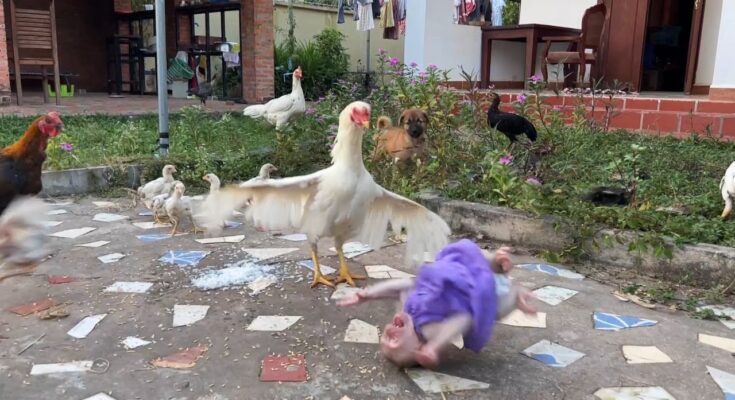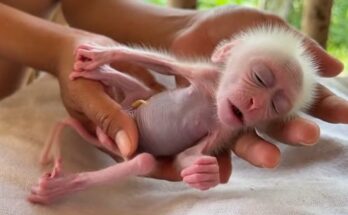🐵❤️ Unlikely Friendship Sparks Online Buzz!
In a heart-melting scene captured deep in the countryside, a baby monkey and a chicken — affectionately known by locals as the “chicken monkey” — shared more than just food. They shared a moment that left viewers in awe.
What started as a simple act of kindness quickly turned into one of the most talked-about animal friendships online!
Playful & fun:
“Feeding a baby monkey sounds fun… until they steal the spoon, your heart, and maybe your sandwich! 🍌💛”
Curious & engaging:
“Can you really feed a baby monkey like a pet? Let’s find out—one tiny bite at a time! 🐒👶🍽️”
Cute with a caution twist:
“They may look cute during feeding time, but raising a baby monkey isn’t all bananas and cuddles! 🍌😅”
Cute & heartwarming:
“Laughter, cuddles, and monkey mischief — could this tiny friend be the secret to a happier home? 🐵🏡❤️”
Playful & curious:
“Think your kids are a handful? Wait until a baby monkey joins the family fun! 😂🐒”
Realistic with a sweet twist:
“They bring joy, laughter, and a little chaos — but can a baby monkey really make your family happier? Let’s find out!”
🥣 The Unexpected Meal Share
One sunny morning, while being fed by their caretakers, the baby monkey noticed the chicken eyeing his favorite fruits. Instead of chasing it away, the monkey gently pushed a piece of banana toward the chicken — a move no one expected.
Within seconds, the chicken pecked at the fruit, and the two animals began sharing their meal like old friends. Their bond was evident. They ate peacefully, side by side, stealing glances and even nudging each other with affection.
🌍 Why It Matters
In a world full of chaos, this unlikely duo reminds us of the simple joy of sharing. Despite being completely different species, their moment of unity sent a powerful message: compassion knows no boundaries.
📢 Share the Love!
Don’t forget to share this post if it warmed your heart. The world needs to see more of this beautiful bond.
🍼 1. Age Matters – Know What Stage the Monkey Is In
- Newborn to 2 months: Needs a milk-only diet, usually every 2–4 hours.
- 2 to 6 months: Begin introducing soft solids like mashed fruits while continuing milk.
- 6 months and older: Gradually transition to more variety in fruits, veggies, and monkey-safe protein sources.
🥛 2. Milk Formula – Not Just Any Milk
- Never use cow’s milk – it’s too harsh for their stomach.
- Use a special primate milk replacer (e.g., Esbilac Puppy Milk or Zoologic 33/40), which closely mimics monkey mother’s milk.
- Feed with a nurser bottle or syringe with care to avoid choking.
- Warm the milk to body temperature (about 37°C / 98.6°F).
🍌 3. Solid Food – Start Soft and Natural
Once the monkey is ready for solids (2–3 months), you can begin with:
- Mashed banana, papaya, or mango
- Soft boiled sweet potato
- Smashed boiled egg yolk
- Steamed vegetables like carrots or peas
⚠️ Avoid anything processed, salty, sugary, or spicy.
💧 4. Hydration is Crucial
- Always provide clean, fresh water.
- Use a small shallow bowl or a pet water bottle.
- Avoid sugary drinks or fruit juices.
🚫 5. Foods to NEVER Feed a Baby Monkey
- Chocolate
- Avocado (can be toxic in large amounts)
- Onions or garlic
- Caffeine (coffee, tea, soda)
- Alcohol (yes, some people try—never do this)
🕒 6. Feeding Schedule Example (3–6 Months)
| Time | Meal |
|---|---|
| 7:00 AM | Warm milk + mashed banana |
| 10:00 AM | Small piece of soft fruit or egg yolk |
| 1:00 PM | Milk + soft vegetable mash |
| 4:00 PM | Fruit snack |
| 7:00 PM | Milk before sleep |
🧼 7. Hygiene & Clean Feeding
- Sterilize bottles and feeding tools.
- Wash your hands before and after handling food.
- Clean up spilled food quickly to avoid attracting insects.
❤️ 8. Bonding Time
Feeding is not just nutrition — it’s a bonding ritual.
- Talk softly while feeding.
- Gently hold the monkey close for comfort.
- Use this time to build trust and emotional connection.
If you’re planning to keep or care for a baby monkey, remember:
They require as much attention as a human toddler — sometimes more.
Always check with a vet or exotic animal specialist for personalized advice.



